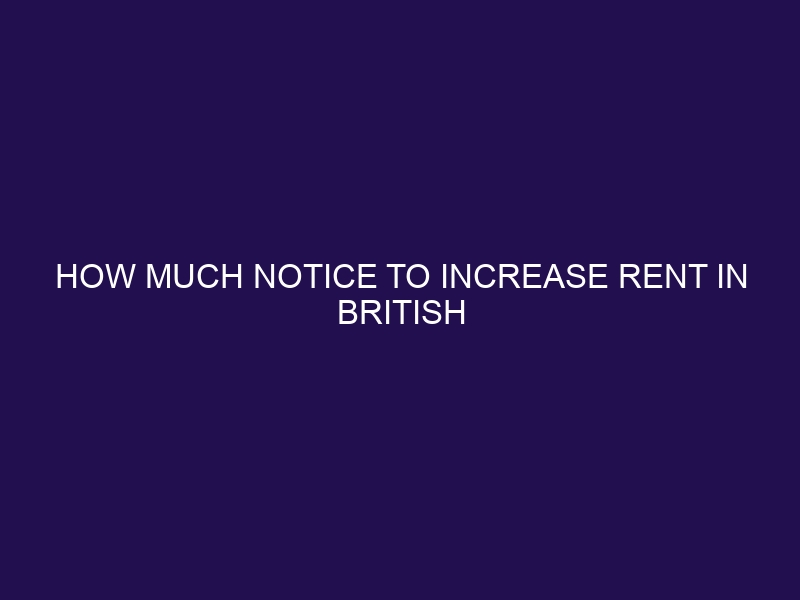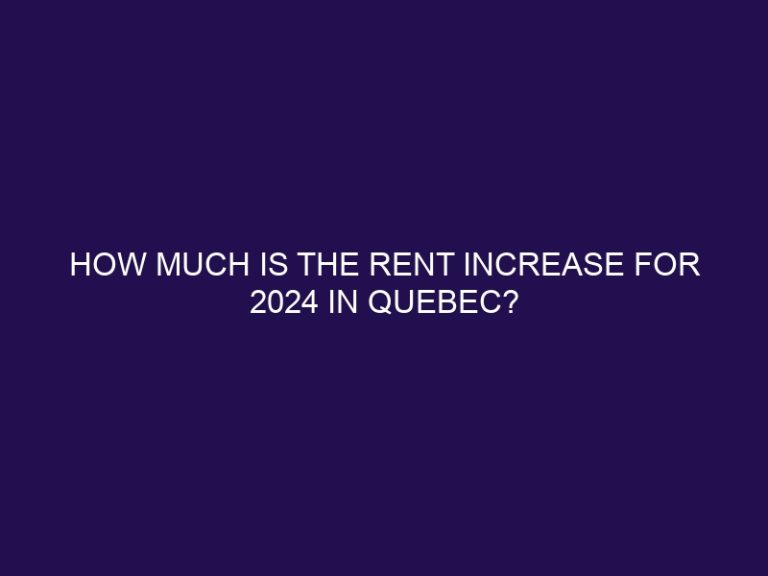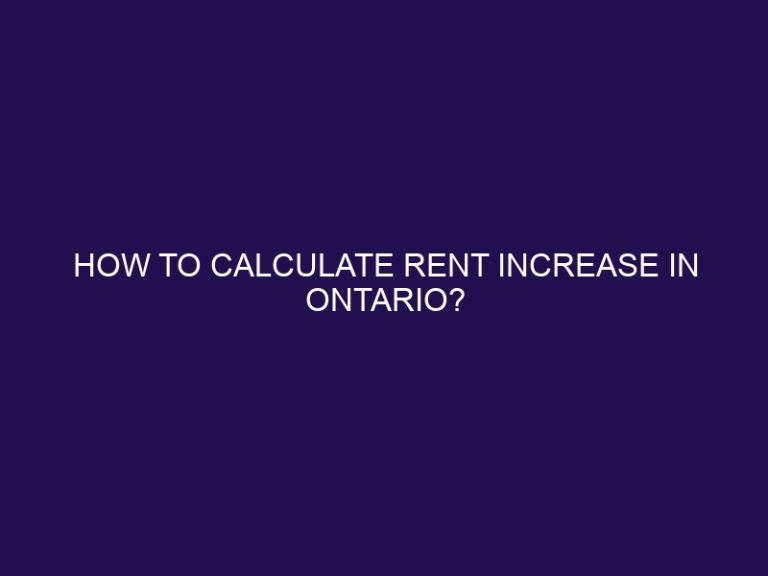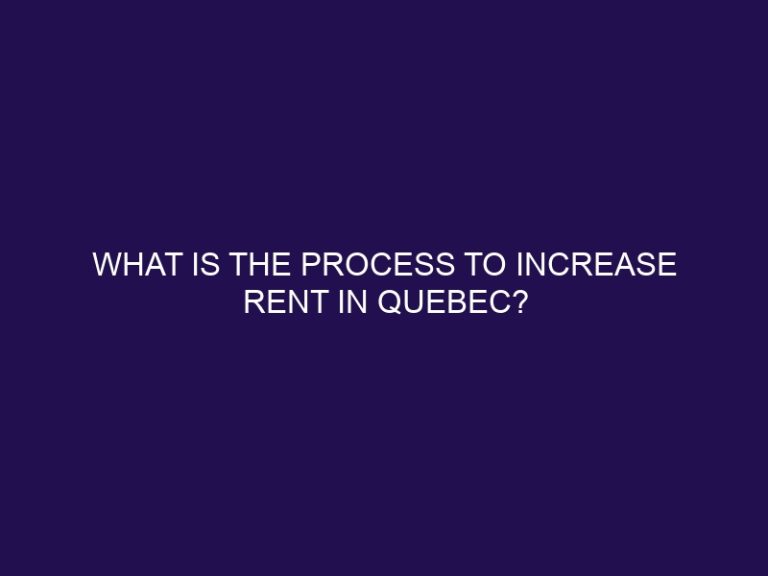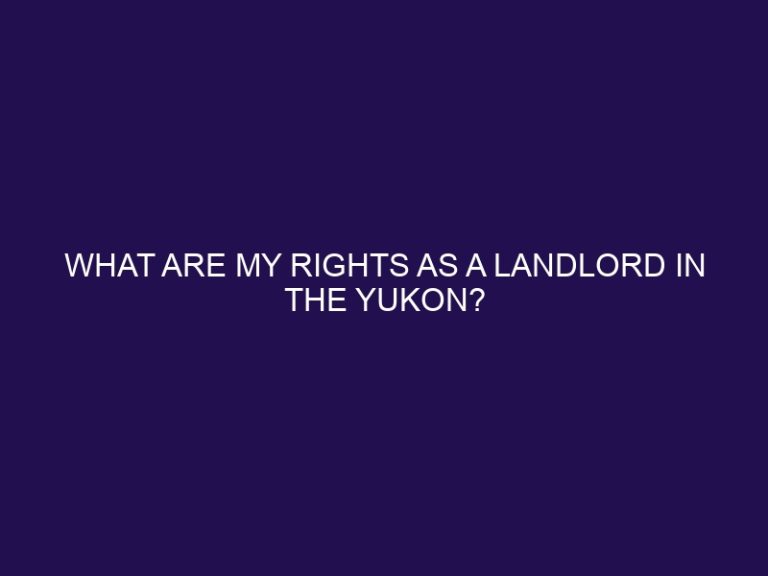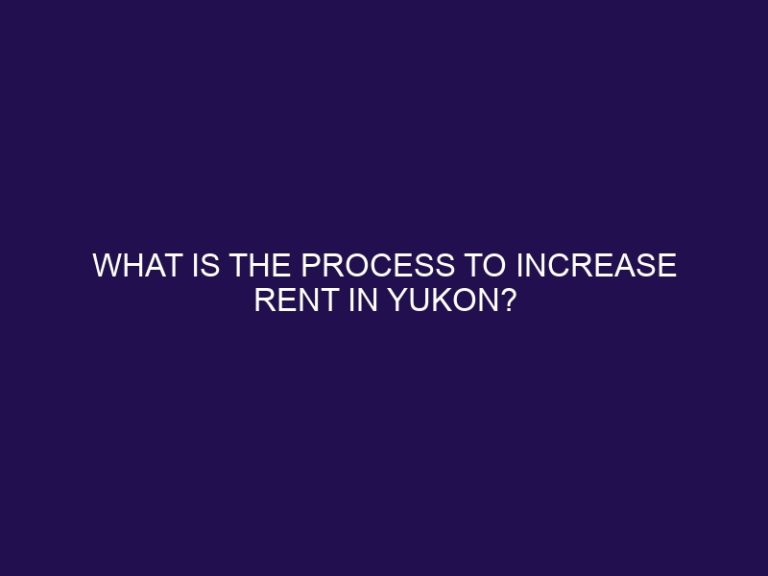How much notice to increase rent in British Columbia?
.jpg)
Understanding British Columbia’s Rent Increase Regulations
In British Columbia, there are strict regulations in place to govern rent increases in order to protect tenants from excessive hikes. Familiarizing yourself with these regulations is essential for both landlords and tenants. This article aims to provide clarity on how much notice is required to increase rent in British Columbia and the rights and options available to tenants.
What Is the Maximum Allowable Rent Increase?
The maximum allowable rent increase is the limit set by the government on how much a landlord can increase the rent each year. This amount is determined based on various factors and is subject to change.
How Does the Maximum Allowable Rent Increase Get Determined?
The maximum allowable rent increase percentage is calculated using a formula specified in the Residential Tenancy Act. This formula takes into account the provincial Consumer Price Index and other factors to determine the annual percentage increase.
What Is the Current Maximum Allowable Rent Increase Percentage?
The current maximum allowable rent increase percentage in British Columbia may vary from year to year. It is important for both landlords and tenants to stay updated on the latest regulations and guidelines provided by the Residential Tenancy Branch.
How Much Notice is Required to Increase Rent?
When a landlord wishes to increase the rent, they must provide the tenant with a formal notice of the rent increase. The notice period required for rent increases in British Columbia is governed by specific regulations.
What Is the Notice Period for Rent Increase in British Columbia?
The notice period for rent increase in British Columbia is typically two full rental months. This means that the landlord must provide the tenant with written notice at least two full rental months before the effective date of the rent increase.
Are There Different Notice Periods for Different Types of Tenancies?
Yes, there are different notice periods for different types of tenancies. The notice period may vary depending on factors such as the length of the tenancy, the type of rental unit, and whether the tenant lives in subsidized housing.
What Happens if the Landlord Does Not Give the Required Notice?
If a landlord fails to provide the required notice for a rent increase, they may not be able to enforce the increased rent amount. Tenants have rights and recourse in such situations.
By understanding these regulations and rights, both landlords and tenants can navigate rent increases in British Columbia more confidently and ensure compliance with the law.
Key takeaways:
- The notice period for rent increase in British Columbia is determined by the type of tenancy. For fixed-term tenancies, the landlord must provide written notice at least three months before the end of the tenancy, and for month-to-month tenancies, the notice period is generally three months.
- If the landlord fails to give the required notice, the tenant may dispute the rent increase and the Residential Tenancy Branch may not approve it.
- Tenants have the right to dispute an excessive rent increase by applying to the Residential Tenancy Branch. If the Branch determines the increase is excessive, it may order a lower amount or even return the rent to the previous amount.
Understanding British Columbia’s Rent Increase Regulations
Understanding British Columbia’s Rent Increase Regulations is essential for both landlords and tenants in British Columbia. These regulations provide important guidelines for rent increases in the province. It is crucial for landlords to give tenants a written notice three months in advance before raising the rent. Additionally, the rent increase must adhere to the maximum allowable increase determined by the Residential Tenancy Branch annually. Landlords are also prohibited from raising the rent more than once within a 12-month period. To ensure compliance and prevent any conflicts or legal matters, both landlords and tenants should familiarize themselves with these regulations.
What Is the Maximum Allowable Rent Increase?
In British Columbia, landlords can increase the rent for existing tenants once every 12 months. There are guidelines in place to protect tenants from excessive rent hikes. The maximum allowable rent increase for 2023 is 1.5%. This means that landlords cannot increase the rent by more than 1.5% of the current rent amount. It is important for landlords to follow these rules to ensure fair and affordable housing for tenants. Fun fact: The Residential Tenancy Branch in British Columbia provides resources and information on tenant rights and responsibilities.
What Is the Maximum Allowable Rent Increase?
In British Columbia, landlords can increase the rent for existing tenants once every 12 months. However, there are guidelines in place to protect tenants from excessive rent hikes, including the maximum allowable rent increase for 2023, which is 1.5%. This means that landlords cannot increase the rent by more than 1.5% of the current rent amount. It is crucial for landlords to adhere to these rules to ensure fair and affordable housing for tenants. Fun fact: The Residential Tenancy Branch in British Columbia provides resources and information on tenant rights and responsibilities.
How Does the Maximum Allowable Rent Increase Get Determined?
In British Columbia, the maximum allowable rent increase is determined by the Residential Tenancy Branch. The process involves considering the province’s Rent Increase Guideline, which is based on the inflation rate. How Does the Maximum Allowable Rent Increase Get Determined? The guideline is usually set annually and determines the maximum percentage by which landlords can increase the rent. For example, in 2021, the maximum allowable rent increase was 1.4%. The Residential Tenancy Branch takes into account economic factors and affordability for tenants when determining the guideline. This ensures that rent increases are fair and reasonable, providing stability for both landlords and tenants.
What Is the Current Maximum Allowable Rent Increase Percentage?
The current maximum allowable rent increase percentage in British Columbia is determined annually by the government. As of now, the specific percentage is subject to change based on the regulations implemented by the Residential Tenancy Branch. It’s important for landlords to adhere to these regulations and provide the required notice period to tenants when intending to increase the rent. Tenants, on the other hand, have the right to challenge an excessive rent increase. If they disagree with the proposed increase, they can refuse to pay until the matter is resolved.
How Much Notice is Required to Increase Rent?
In British Columbia, landlords are required by law to provide their tenants with a written notice at least three months before increasing the rent. How much notice is required to increase rent? This notice must include the amount of the increase and the date when it will take effect. The purpose of this regulation is to allow tenants sufficient time to plan and make necessary adjustments to their budget. It is important for landlords to adhere to these guidelines to maintain a transparent and fair rental agreement. Providing proper notice helps foster a positive landlord-tenant relationship, promoting trust and cooperation.
What Is the Notice Period for Rent Increase in British Columbia?
What Is the Notice Period for Rent Increase in British Columbia?
The notice period for rent increase in British Columbia depends on the type of tenancy. For fixed-term tenancies, landlords cannot increase the rent until the end of the term, unless it is written in the tenancy agreement. For month-to-month tenancies, landlords must provide a written notice of at least three rental payment periods. If the tenant disagrees with the rent increase, they can challenge it by filing an application with the Residential Tenancy Branch. Pro-tip: Tenants should review their tenancy agreement and consult the Residential Tenancy Act for specific details on rent increase notice periods.
Are There Different Notice Periods for Different Types of Tenancies?
Different types of tenancies in British Columbia may have different notice periods for rent increases. “Are There Different Notice Periods for Different Types of Tenancies?” For a monthly tenancy, landlords are required to provide three full rental months’ notice before increasing the rent. [4.2] For a fixed-term tenancy, the rent cannot be increased until the term ends, unless a rent increase clause is specified in the tenancy agreement. [4.1] For a subsidized housing tenancy, the notice period may vary depending on the specific program or agreement. It is crucial for both landlords and tenants to be aware of the specific notice requirements to ensure compliance with the regulations and avoid any disputes or legal issues.
Historically, different notice periods for different types of tenancies have been in place to provide flexibility and address the unique circumstances of each situation. This approach allows for a fair balance between the rights and responsibilities of landlords and tenants in British Columbia’s rental market.
What Happens if the Landlord Does Not Give the Required Notice?
If the landlord fails to give the required notice for a rent increase in British Columbia, there are consequences. What happens if the landlord does not give the required notice? The tenant is not obligated to pay the increased rent until proper notice is received. In some cases, the tenant may even be entitled to a rent reduction or reimbursement for any excess paid. The Residential Tenancy Branch can assist tenants in resolving disputes with their landlords regarding rent increases. It is important for tenants to be aware of their rights and options in these situations to ensure fair treatment.
What Are the Exceptions to the Notice Period?
In British Columbia, landlords are generally required to provide tenants with a notice period to increase rent, which is usually three months. There are exceptions to this rule. “What Are the Exceptions to the Notice Period?” The following are some circumstances that may allow landlords to provide a shorter notice period:
| 1. | Temporary accommodation: | If the rental unit is being used as temporary accommodation, such as hotels or hostels, landlords may provide a shorter notice period. |
|---|---|---|
| 2. | Seasonal rental units: | For seasonal rental units, landlords may provide a shorter notice period if the unit is only rented for a specific period each year, and the notice is given before the start of the rental period. |
| 3. | Manufactured home site tenancies: | For tenancies in manufactured home parks, the notice period may be shorter if the increase in rent is based on a local government order. |
Remember to always check the Residential Tenancy Act for specific details and any additional exceptions that may apply.
Are There Any Situations Where the Notice Period Does Not Apply?
Are There Any Situations Where the Notice Period Does Not Apply?
In British Columbia, there are certain situations where the notice period for rent increase does not apply. These exceptions include:
|
|
What If the Landlord Wants to Increase Rent More Than the Allowable Amount?
If a landlord in British Columbia wants to increase the rent more than the allowable amount, they must follow specific legal procedures. The Residential Tenancy Branch regulates rent increases and tenants have rights to challenge excessive increases. What if the landlord wants to increase rent more than the allowable amount? The landlord must provide proper notice and follow the guidelines set by the Residential Tenancy Act. If the landlord fails to comply with the regulations, the tenant can dispute the increase with the Residential Tenancy Branch. Tenants also have the option to refuse to pay the increased rent if they believe it exceeds the allowable amount.
What Are the Tenant’s Rights and Options?
When faced with a rent increase in British Columbia, tenants have rights and different options to consider. What are the tenant’s rights and options? It is important to be aware of these rights and understand the options available. Here are some key things to keep in mind:
– Tenant’s rights: Tenants have the right to receive proper notice before a rent increase and to dispute unreasonable increases. They also have the right to be informed of any changes to the tenancy agreement.
– Option 1: Negotiation: Tenants can negotiate with the landlord to find a mutually agreeable solution, such as a smaller increase or a longer notice period.
– Option 2: Mediation: If a resolution cannot be reached through negotiation, tenants can seek mediation through the Residential Tenancy Branch to facilitate a fair agreement.
– Option 3: Dispute resolution: In cases of disputes, tenants can file a dispute resolution application with the Residential Tenancy Branch to have their case heard and resolved.
Understanding these rights and options can help tenants navigate the process of a rent increase and make informed decisions.
Can the Tenant Challenge an Excessive Rent Increase?
Can the Tenant Challenge an Excessive Rent Increase?
In British Columbia, tenants have the right to challenge excessive rent increases imposed by landlords. The Residential Tenancy Branch (RTB) offers a formal dispute resolution process that enables tenants to contest rent increases they deem unreasonable. To challenge an excessive rent increase, the tenant must submit a dispute resolution request to the RTB within 30 days of receiving the rent increase notice. The RTB will then carefully examine the evidence presented by both parties and make a decision based on the specific circumstances. If the RTB determines that the rent increase is indeed excessive, they have the authority to order the landlord to lower the rent or provide a refund to the tenant.
If the Tenant Disagrees with the Rent Increase, Can They Refuse to Pay?
If a tenant disagrees with a rent increase in British Columbia, can they simply refuse to pay? They cannot. They have the right to dispute the increase by applying for dispute resolution with the Residential Tenancy Branch. During the dispute resolution process, the tenant can continue paying the rent at the original amount until a decision is reached. It is essential for tenants to carefully review the notice and seek legal advice if necessary. Pro-tip: Tenants should always keep records of their communication and follow proper procedures to protect their rights.
Some Facts About How Much Notice to Increase Rent in British Columbia:
- ✅ The province of British Columbia limits how much landlords can raise rent each year, with the rate set by the housing minister. (Source: CBC News)
- ✅ Rent can be raised by up to 3.5% in 2024 in British Columbia. (Source: CBC News)
- ✅ Landlords in British Columbia can only raise rent once a year and must give tenants three months’ notice. (Source: CBC News)
- ✅ There are exceptions to the set annual rate increase, including if the landlord has permission from the tenants, if operating costs have increased, or if money has been spent on property improvements. (Source: CBC News)
- ✅ Agreements for rent increases in British Columbia need to be confirmed in writing and tenants still require three months’ notice. (Source: CBC News)
Frequently Asked Questions
How much notice does a landlord need to give to increase rent in British Columbia?
The landlord must provide tenants with an approved form, called the Notice of Rent Increase, three full months before the increase takes effect. This is to ensure tenants have sufficient time to prepare for the change in rental rates.
Can a landlord raise the rent more than once a year in British Columbia?
No, landlords in British Columbia can only increase the rent once every 12 months, excluding the first year of the tenancy. This is to prevent excessive and frequent rent hikes that may burden tenants financially.
Are there any exceptions to the strict procedures for rent increases in British Columbia?
Yes, there are exceptions to the set annual rate increase. Landlords can apply for additional rent increases above the allowable percentage in exceptional circumstances, such as capital expenditures or increased operating costs. However, this requires following specific procedures and often involves the Residential Tenancy Branch (RTB) and an application fee.
What happens if a landlord raises the rent without following the proper notice period in British Columbia?
If the landlord gives less than three months’ notice, tenants have the right to continue paying the current rent amount until the correct notice period has passed. Landlords cannot retroactively apply the rent increase if the proper notice period was not given.
Can tenants refuse a rent increase in British Columbia?
Tenants have the right to refuse a rent increase, especially if they feel it is excessive or unreasonable. However, if the landlord follows the proper procedures, including providing the required notice and following allowable percentage limits, tenants may have limited recourse to prevent the increase.
Is there any assistance available for tenants dealing with rent increases in British Columbia?
Yes, tenants in British Columbia can seek guidance and assistance from resources such as the Tenant Resource and Advisory Centre (TRAC), which provides information on rental rights, including plain language content on additional rent increases, capital expenditures, and other related topics.

